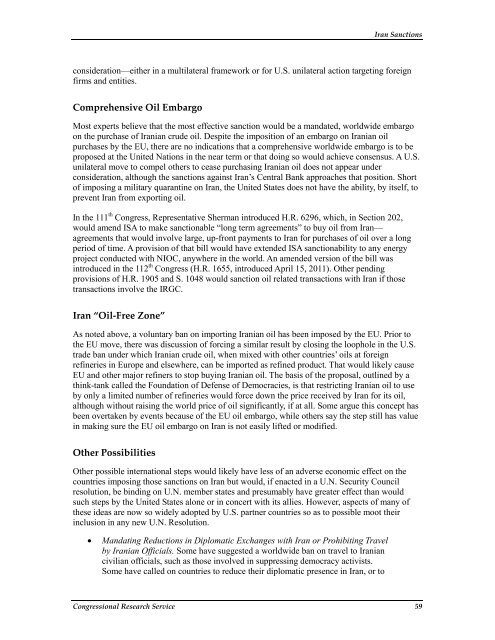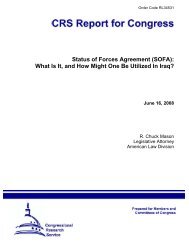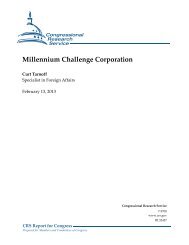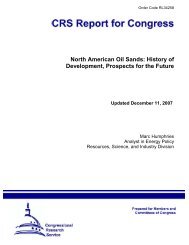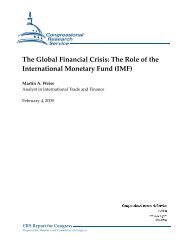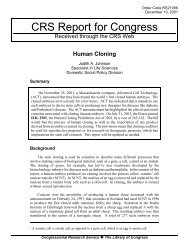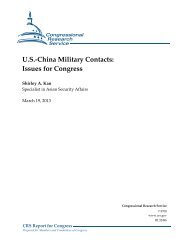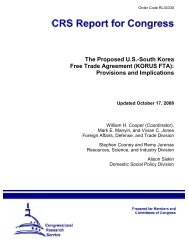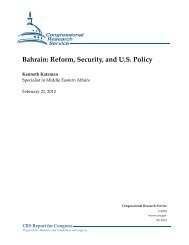Iran Sanctions - Foreign Press Centers
Iran Sanctions - Foreign Press Centers
Iran Sanctions - Foreign Press Centers
You also want an ePaper? Increase the reach of your titles
YUMPU automatically turns print PDFs into web optimized ePapers that Google loves.
<strong>Iran</strong> <strong>Sanctions</strong><br />
consideration—either in a multilateral framework or for U.S. unilateral action targeting foreign<br />
firms and entities.<br />
Comprehensive Oil Embargo<br />
Most experts believe that the most effective sanction would be a mandated, worldwide embargo<br />
on the purchase of <strong>Iran</strong>ian crude oil. Despite the imposition of an embargo on <strong>Iran</strong>ian oil<br />
purchases by the EU, there are no indications that a comprehensive worldwide embargo is to be<br />
proposed at the United Nations in the near term or that doing so would achieve consensus. A U.S.<br />
unilateral move to compel others to cease purchasing <strong>Iran</strong>ian oil does not appear under<br />
consideration, although the sanctions against <strong>Iran</strong>’s Central Bank approaches that position. Short<br />
of imposing a military quarantine on <strong>Iran</strong>, the United States does not have the ability, by itself, to<br />
prevent <strong>Iran</strong> from exporting oil.<br />
In the 111 th Congress, Representative Sherman introduced H.R. 6296, which, in Section 202,<br />
would amend ISA to make sanctionable “long term agreements” to buy oil from <strong>Iran</strong>—<br />
agreements that would involve large, up-front payments to <strong>Iran</strong> for purchases of oil over a long<br />
period of time. A provision of that bill would have extended ISA sanctionability to any energy<br />
project conducted with NIOC, anywhere in the world. An amended version of the bill was<br />
introduced in the 112 th Congress (H.R. 1655, introduced April 15, 2011). Other pending<br />
provisions of H.R. 1905 and S. 1048 would sanction oil related transactions with <strong>Iran</strong> if those<br />
transactions involve the IRGC.<br />
<strong>Iran</strong> “Oil-Free Zone”<br />
As noted above, a voluntary ban on importing <strong>Iran</strong>ian oil has been imposed by the EU. Prior to<br />
the EU move, there was discussion of forcing a similar result by closing the loophole in the U.S.<br />
trade ban under which <strong>Iran</strong>ian crude oil, when mixed with other countries’ oils at foreign<br />
refineries in Europe and elsewhere, can be imported as refined product. That would likely cause<br />
EU and other major refiners to stop buying <strong>Iran</strong>ian oil. The basis of the proposal, outlined by a<br />
think-tank called the Foundation of Defense of Democracies, is that restricting <strong>Iran</strong>ian oil to use<br />
by only a limited number of refineries would force down the price received by <strong>Iran</strong> for its oil,<br />
although without raising the world price of oil significantly, if at all. Some argue this concept has<br />
been overtaken by events because of the EU oil embargo, while others say the step still has value<br />
in making sure the EU oil embargo on <strong>Iran</strong> is not easily lifted or modified.<br />
Other Possibilities<br />
Other possible international steps would likely have less of an adverse economic effect on the<br />
countries imposing those sanctions on <strong>Iran</strong> but would, if enacted in a U.N. Security Council<br />
resolution, be binding on U.N. member states and presumably have greater effect than would<br />
such steps by the United States alone or in concert with its allies. However, aspects of many of<br />
these ideas are now so widely adopted by U.S. partner countries so as to possible moot their<br />
inclusion in any new U.N. Resolution.<br />
• Mandating Reductions in Diplomatic Exchanges with <strong>Iran</strong> or Prohibiting Travel<br />
by <strong>Iran</strong>ian Officials. Some have suggested a worldwide ban on travel to <strong>Iran</strong>ian<br />
civilian officials, such as those involved in suppressing democracy activists.<br />
Some have called on countries to reduce their diplomatic presence in <strong>Iran</strong>, or to<br />
Congressional Research Service 59


